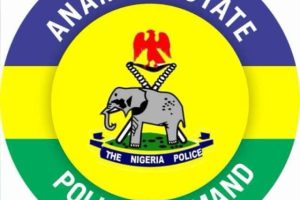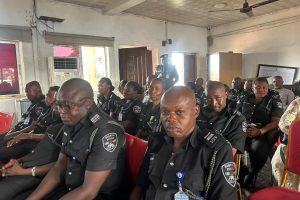The Special Anti-Robbery Squad was founded in 1992 by former police commissioner Simeon Danladi Midenda. The major reason SARS was formed was when Col. Rindam, a Nigerian Army Colonel was killed by police officers at a checkpoint in Lagos . When the information reached the army, soldiers were dispatched into the streets of Lagos in search of any police officer.
The Nigerian police withdrew from checkpoints, security areas and other points of interest for criminals, some police officers were said to have resigned while others fled for their lives. Due to the absence of police for two weeks crime rate increased and SARS was formed with only 15 officers operating in the shadows without knowledge of the army while monitoring police radio chatters.
Due to the existence of already established three anti-robbery squad which was operational at that time, Midenda needed to distinguish his squad from the already existing teams. Midenda named his team Special Anti-Robbery Squad ( SARS ). After months of dialogue the Nigerian Army and the Nigeria Police Force came to an understanding and official police duties began again in Lagos .
The SARS unit was officially commissioned in Lagos following a ceasefire by the army after settlement.
SARS is one of the 14 units in the Force Criminal Investigation and Intelligence Department which was established to detain, investigate and prosecute people involved in crimes like armed robbery, kidnapping and other forms of crimes.
In 2009, after several years of operations the squad grew in number and strength. Due to the surge of internet fraudsters and cultism in universities, SARS operatives infiltrated Nigerian universities, made several successful arrest but in the process harassed innocent youths.
According to a publication by Pulse.ng a Nigerian news website, “What SARS became was a national scourge that a witch-hunt machinery against Nigerian youth with dreadlocks, piercings, cars, expensive phones and risque means of expression.”
In May 2010, Amnesty International disclosed that it would be suing the Nigerian Police over human rights abuse stating that the Special Anti-Robbery Squad in Borokiri, Port Harcourt arrested three bike riders and detained them for over one week while being “beaten every night with the butt of a gun and iron belt.”
On 20 May 2010, a Federal High Court in Enugu State , ordered the then IGP Ogbonna Okechukwu Onovo to produce a Special Anti-Robbery Squad officer who had gunned down a 15 years-old boy in high school. According to the SARS officer, the teen was mistaken for a kidnapper.
On 27 July 2010, an extensive editorial report was published by Sahara Reporters on how SARS among other police unit profit 9.35Billion Naira ($60million) from roadblocks and extortion within 18 months.
On 3 June 2011, the Nigeria Police Forced discovered an attempt by a SARS operative Musa Agbu to bomb the force headquarters because the IGP Hafiz Ringim scuttled his ambition.
Following several reports of human rights violation by members of the public to the office of the Inspector General of Police, on 7 August 2015, the then IGP Solomon Arase announced that it would be splitting the SARS unit into two units, operational unit and the investigation unit to curtail case of human rights violation.
In September 2016, Pulse.ng compiled a report on Nigeria Police brutality with the heading
“Meet SARS, the Police Unit with license to kill”. The report highlighted the brutality and ignorance of the rules of engagement in the Special Anti-Robbery Squad.
Modus operandi
During its formation the Special Anti-Robbery Squad was known to operate covertly. SARS operatives were not allowed to wear police uniform, publicly carry guns or have walkie-talkies. They were given unmarked vehicles with sometimes no license plates or private plate numbers during duty.
Controversy
End SARS Campaign
In December 2016, Segun Awosanya started an online advocacy campaign to end SARS brutality in the country. Awonsanya started the online campaign with an hashtag, #EndSARS. The public responded well to the hashtag with people all over Nigeria posting their SARS experience. The campaign got international attention from media.
Presidency’s Attempt to Reform SARS
On 14 August, 2018 the Acting President of Nigeria Yemi Osinbajo ordered with immediate effect the “Overhaul” of the controversial police unit SARS following reports of human rights violation. The acting president ordered the Inspector General of Police Ibrahim Kpotun Idris to reform SARS as well as carrying out an independent investigation after “persistent complaints and reports” that concerns human rights violation.
After the order, the IGP announced that the unit would be renamed to Federal Special Anti-Robbery Squad, a new head of the unit would be appointed and also the provision of human rights desk officers to check reports.
Decentralization of SARS
On 21 January 2019 IGP Mohammed Adamu ordered the immediate decentralization of the Special Anti-Robbery Squad. The SARS unit was centralized from the force headquarters in Abuja since its inception, the IGP also stated that the DIG of Force Criminal Investigations Department and Commissioners of Police in each state would be held accountable for actions of the SARS.
Incidents
On 10 August 2019, while SARS operatives were on a raid in Ijegun to arrest kidnappers in the area, operatives of the unit fired several shots in a bid to subdue the kidnappers and during the course of action a stray bullet hit a pregnant woman, she reportedly died on the spot. An angry mob was said to have lynched two police officers on the spot.
On 21 August 2019, four SARS operatives were arrested and charged with murder after being caught on film manhandling and then shooting to death two suspected phone thieves in broad daylight. The two suspected phone thieves were shot dead after they had been arrested.
On 5 September 2019, operatives of the Special Anti-Robbery Squad in Lekki , Lagos allegedly kidnapped, tortured and robbed Nigerian rapper Ikechukwu Onunaku . According to publications by Punch Nigeria the rapper was forced to make several withdrawals at the ATM to pay SARS operatives for doing nothing.
January 13, 2026









Add Comment